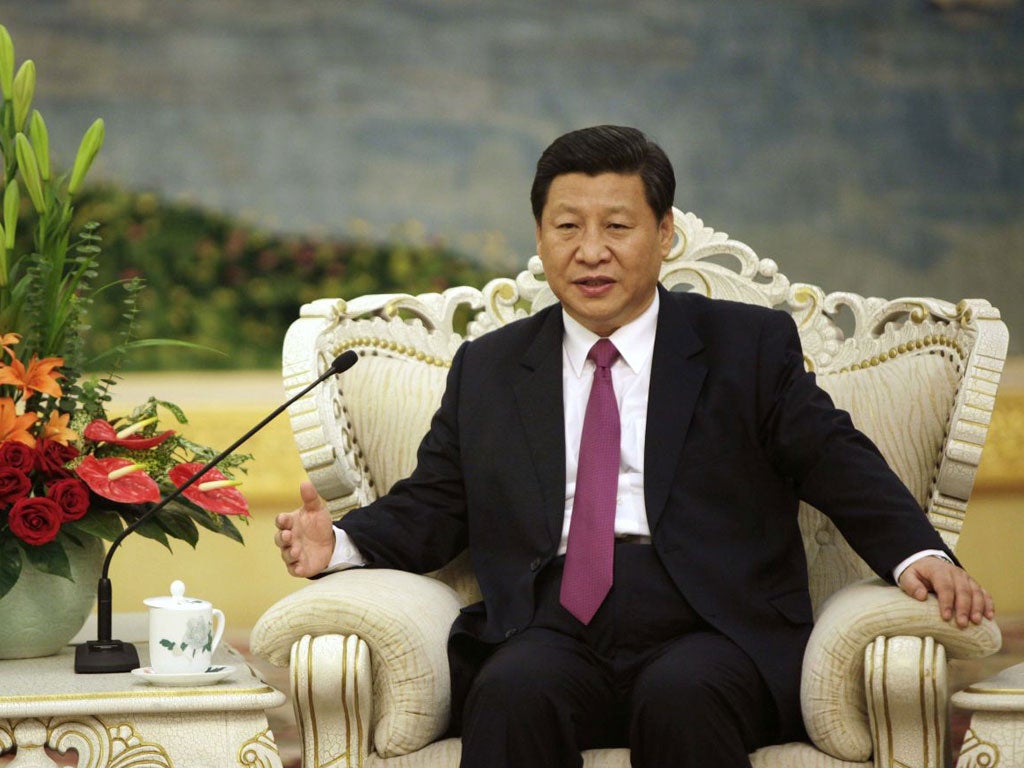China's new leader signals prospect of reform
Observers say Xi Jinping is likely to favour faster economic and possibly political liberalisation

Your support helps us to tell the story
From reproductive rights to climate change to Big Tech, The Independent is on the ground when the story is developing. Whether it's investigating the financials of Elon Musk's pro-Trump PAC or producing our latest documentary, 'The A Word', which shines a light on the American women fighting for reproductive rights, we know how important it is to parse out the facts from the messaging.
At such a critical moment in US history, we need reporters on the ground. Your donation allows us to keep sending journalists to speak to both sides of the story.
The Independent is trusted by Americans across the entire political spectrum. And unlike many other quality news outlets, we choose not to lock Americans out of our reporting and analysis with paywalls. We believe quality journalism should be available to everyone, paid for by those who can afford it.
Your support makes all the difference.With just weeks to go before the once-in-a-decade transition of power to a new leadership, China's president-in-waiting, Xi Jinping, has made pro-reform remarks that could signal a new direction for the world's most populous nation.
There is much speculation about what political direction China will take after the 18th Party Congress next month, at which Mr Xi will start taking over as Communist Party boss, president and then head of the military. The whole process will take months.
Citing sources, the Reuters news agency reported that Mr Xi had met with a leading reformer, Hu Deping, in the past six weeks. By meeting Mr Hu, the eldest son of the late former Communist Party General Secretary Hu Yaobang, Mr Xi was showing he was prepared to be more amenable to calls for faster economic liberalisation but also a relaxation of political controls.
"The problems that China has accumulated are unprecedented," one of the sources said, paraphrasing a written summary of Mr Xi's remarks circulated among retired cadres, who retain much influence in China. "We must seek progress and change while remaining steady."
Steve Yui-Sang Tsang, a professor of contemporary Chinese studies and director of the China Policy Institute at the University of Nottingham, said the significance of the remarks was that Mr Xi was making them at all. "What he said was not a real departure from the party consensus, which is that reforms remain essential, and an improved approach desirable," Mr Tsang said. "He has not spelled out the direction he will take."
Among the main problems China faces are corruption, a widening wealth gap and calls for more political representation.
Until now Mr Xi had given no indication of whether he favoured reform or was a conservative like the man he is due to succeed, President Hu Jintao. In the run-up to Mr Hu's assumption of power in 2002, plenty of commentators tried to paint him as a liberal reformer.
Economic reform is an ongoing process, but under the administration of Mr Hu and his premier, Wen Jiabao, political reform has all but dried up in China. However, mounting economic woes and stability issues that could threaten one-party rule by the Communist Party have seen calls for more reform, even from senior figures such as Mr Wen, and it is not impossible that Mr Xi could take a more reform-minded path.
There is little in Mr Xi's CV to suggest that he will be a reformer. Were the Chinese economy in better shape, he would most like focus on keeping China on a steady course rather than try to reform the system, and continue to try to boost the country's global status.
His father, Xi Zhongxun, was the deputy prime minister from 1959 to 1962, making Mr Xi one of the princelings of the Communist Party's political dynasties.
Li Keqiang, the man tipped to replace Mr Wen as premier, has previously called for greater reform, telling a business forum this year: "Faced with the profound changes in international and domestic landscapes, we must let reforms and opening-up continue to lead the way in removing the institutional obstacles that hamper the shift of the growth model."
New projects to boost economy
China gave the green light for 60 infrastructure projects this week, including 1,254 miles of roads, as it looks to energise its sluggish economy that is mired in its worst slow-down in three years.
The country's economic planning body, the National Development and Reform Commission, announced approval for a number of projects, including motorways, ports, urban rail projects and airport runways, worth more than 1 trillion yuan (£100 billion).
This amounts to about 2.1 per cent of China's total economy.
The Chinese government is keen to shore up economic growth before the leadership transition in October.
Join our commenting forum
Join thought-provoking conversations, follow other Independent readers and see their replies
Comments